人教版七年级下册Unit 2 What time do you go to school?单元读写训练课件(共19张PPT)
文档属性
| 名称 | 人教版七年级下册Unit 2 What time do you go to school?单元读写训练课件(共19张PPT) |

|
|
| 格式 | pptx | ||
| 文件大小 | 357.2KB | ||
| 资源类型 | 教案 | ||
| 版本资源 | 人教新目标(Go for it)版 | ||
| 科目 | 英语 | ||
| 更新时间 | 2023-02-10 00:00:00 | ||
图片预览

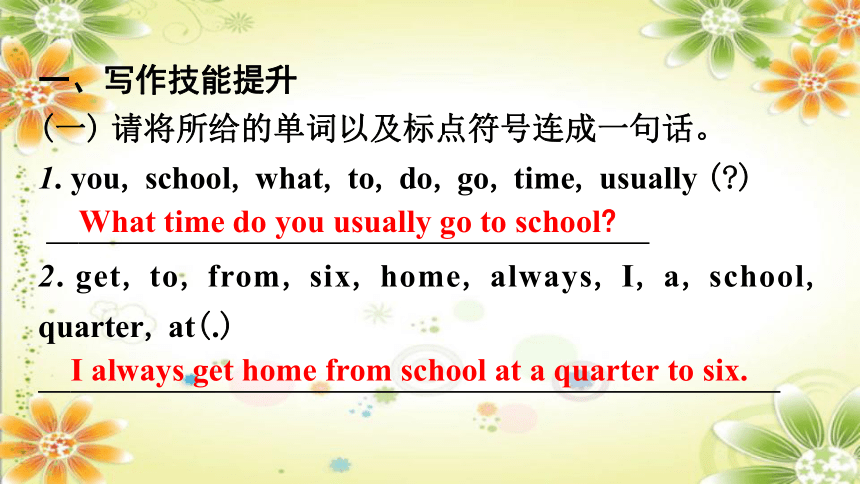
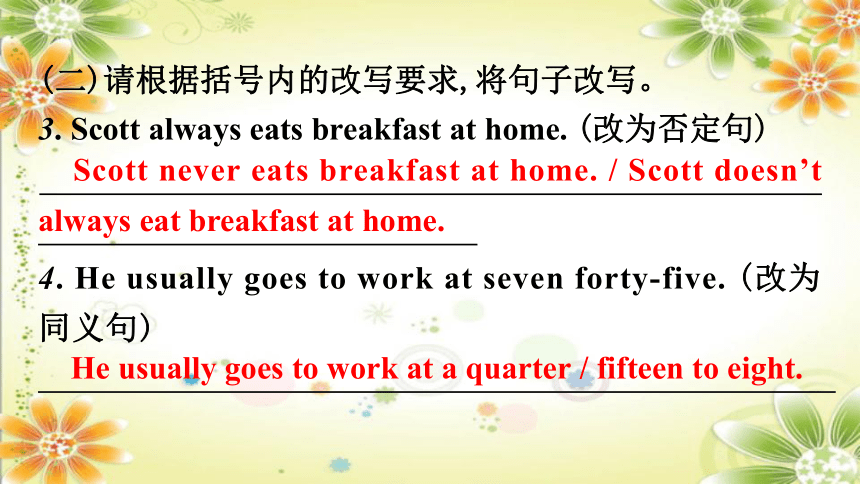
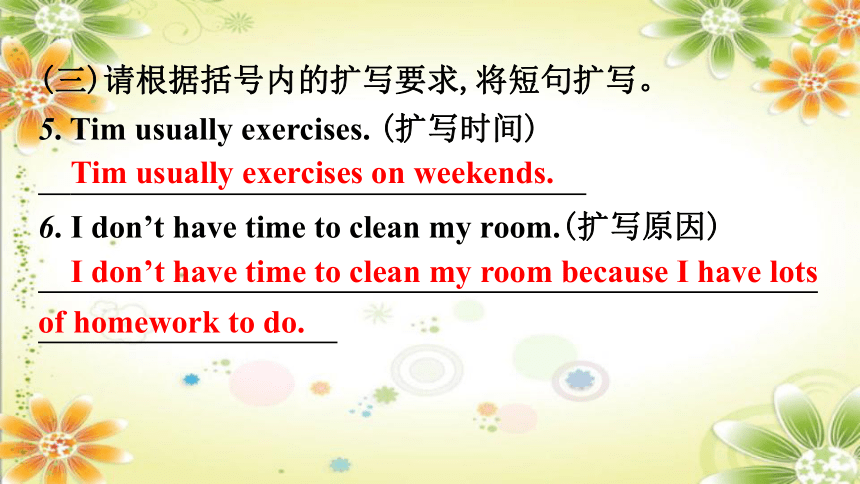
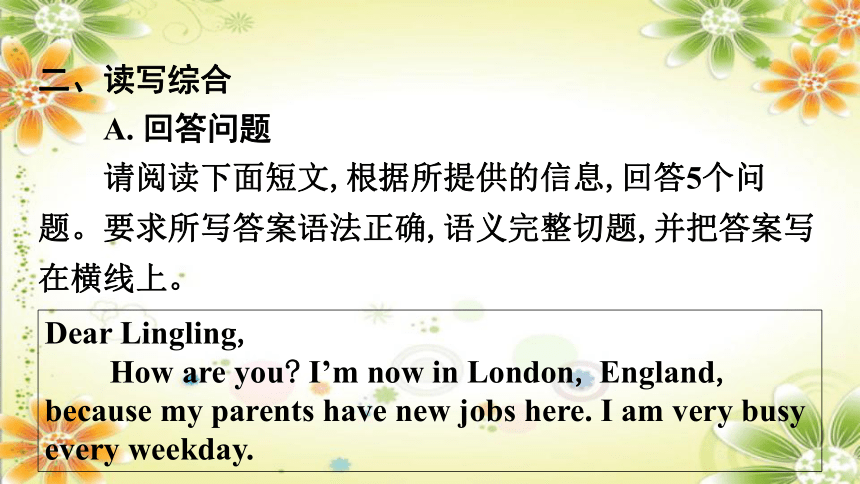
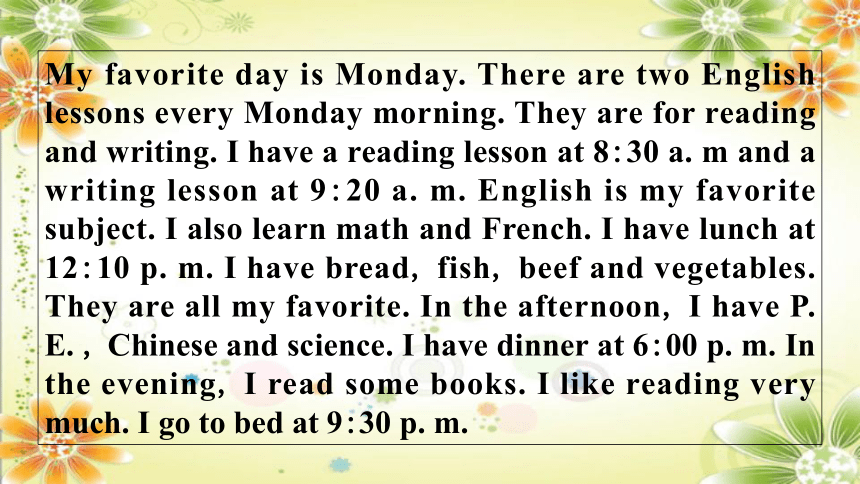
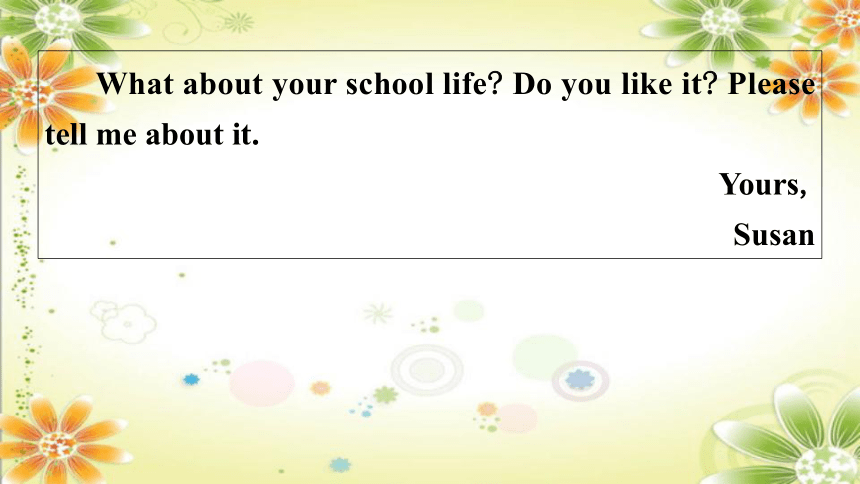
文档简介
(共19张PPT)
Unit 2 What time do you go to school
单元读写训练
一、写作技能提升
(一) 请将所给的单词以及标点符号连成一句话。
1. you, school, what, to, do, go, time, usually ( )
What time do you usually go to school
2. get, to, from, six, home, always, I, a, school, quarter, at(.)
I always get home from school at a quarter to six.
What time do you usually go to school
I always get home from school at a quarter to six.
(二)请根据括号内的改写要求,将句子改写。
3. Scott always eats breakfast at home. (改为否定句)
Scott never eats breakfast at home. / Scott doesn’t always eat breakfast at home.
4. He usually goes to work at seven forty-five. (改为同义句)
He usually goes to work at a quarter / fifteen to eight.
Scott never eats breakfast at home. / Scott doesn’t always eat breakfast at home.
He usually goes to work at a quarter / fifteen to eight.
(三)请根据括号内的扩写要求,将短句扩写。
5. Tim usually exercises. (扩写时间)
Tim usually exercises on weekends.
6. I don’t have time to clean my room.(扩写原因)
I don’t have time to clean my room because I have lots of homework to do.
Tim usually exercises on weekends.
I don’t have time to clean my room because I have lots of homework to do.
二、读写综合
A. 回答问题
请阅读下面短文,根据所提供的信息,回答5个问题。要求所写答案语法正确,语义完整切题,并把答案写在横线上。
Dear Lingling,
How are you I’m now in London, England, because my parents have new jobs here. I am very busy every weekday.
My favorite day is Monday. There are two English lessons every Monday morning. They are for reading and writing. I have a reading lesson at 8:30 a. m and a writing lesson at 9:20 a. m. English is my favorite subject. I also learn math and French. I have lunch at 12:10 p. m. I have bread, fish, beef and vegetables. They are all my favorite. In the afternoon, I have P. E. , Chinese and science. I have dinner at 6:00 p. m. In the evening, I read some books. I like reading very much. I go to bed at 9:30 p. m.
What about your school life Do you like it Please tell me about it.
Yours,
Susan
1. Where is Susan now
Susan / She is in London, England now. / In London, England.
2. What time does Susan have a writing lesson
Susan / She has a writing lesson at 9:20 a. m. /At 9:20 a. m.
3. What’s Susan’s favorite subject, English or math
Susan’s / Her favorite subject is English. / English.
Susan / She is in London, England now. / In London, England.
Susan / She has a writing lesson at 9:20 a. m. /At 9:20 a. m.
Susan’s / Her favorite subject is English. / English.
4. What does Susan have for lunch
Susan / She has bread, fish, beef and vegetables for lunch. / Bread, fish, beef and vegetables.
5. When does Susan go to bed
Susan / She goes to bed at 9:30 p.m. / At 9:30 p. m.
Susan / She has bread, fish, beef and vegetables for lunch. / Bread, fish, beef and vegetables.
Susan / She goes to bed at 9:30 p.m. / At 9:30 p. m.
B. 书面表达
假如你是玲玲,请你写一封信给你的笔友Amy,向她介绍你的日常生活。
内容包括:
(1)收到来信的心情;
(2)你的日常生活习惯,包括好的习惯和不好的习惯;
(3)不好的习惯你打算怎么改正
作文要求:
(1)不能照抄原文;不得在作文中出现真实校名和学生的真实姓名。
(2)语句连贯,词数60左右。作文的开头和结尾已经给出,不计入总词数。
【巧列提纲】( 部分仅供参考,希望同学们多开动脑筋、发散思维)
【实战演练】
Dear Amy,
It’s happy to hear from you.
It’s happy to hear from you.
I usually get up at 6:30 in the morning and then have breakfast. My first class begins at 8:00. I usually have beef, rice and vegetables for lunch at school. After lunch, I always eat ice-cream. My classes finish at 5:00 p.m. After dinner, I do my homework and then take a walk. I go to bed at 9:30.
I usually get up at 6:30 in the morning and then have breakfast. My first class begins at 8:00. I usually have beef, rice and vegetables for lunch at school. After lunch, I always eat ice-cream. My classes finish at 5:00 p.m. After dinner, I do my homework and then take a walk. I go to bed at 9:30.
I know it is a bad habit to eat lots of ice-cream. It is unhealthy and bad for my teeth. So I will only eat it twice a week.
Yours,
Lingling
I know it is a bad habit to eat lots of ice-cream. It is unhealthy and bad for my teeth. So I will only eat it twice a week.
【语言点拨】(以下短语及句子仅供参考,旨在帮助同学们升级文章的语言表达)
1. 表达收到来信的心情
It is glad to … ……很开心
hear from you / receive your letter 收到你的来信
2. 日常生活习惯
my school life 我的学校生活 get up 起床
play tennis 打网球 good habits 好习惯
bad habits 坏习惯 take a shower 淋浴
watch TV 看电视
have English classes 上英语课
read some books 看书
do my homework 做家庭作业
go to bed 上床睡觉
leave home for school 出门去上学
listen to music 听音乐
go to school by bus 乘公共汽车去学校
play computer games 玩电脑游戏
3. 改正坏习惯的方法
eat less junk food 少吃垃圾食品
keep in good health 保持健康
get up early 早起 go to bed early 早睡
exercise in the morning 早上锻炼
drink milk every day 每天喝牛奶
listen to the teacher carefully 认真听讲
practice English more 多练习英语
Unit 2 What time do you go to school
单元读写训练
一、写作技能提升
(一) 请将所给的单词以及标点符号连成一句话。
1. you, school, what, to, do, go, time, usually ( )
What time do you usually go to school
2. get, to, from, six, home, always, I, a, school, quarter, at(.)
I always get home from school at a quarter to six.
What time do you usually go to school
I always get home from school at a quarter to six.
(二)请根据括号内的改写要求,将句子改写。
3. Scott always eats breakfast at home. (改为否定句)
Scott never eats breakfast at home. / Scott doesn’t always eat breakfast at home.
4. He usually goes to work at seven forty-five. (改为同义句)
He usually goes to work at a quarter / fifteen to eight.
Scott never eats breakfast at home. / Scott doesn’t always eat breakfast at home.
He usually goes to work at a quarter / fifteen to eight.
(三)请根据括号内的扩写要求,将短句扩写。
5. Tim usually exercises. (扩写时间)
Tim usually exercises on weekends.
6. I don’t have time to clean my room.(扩写原因)
I don’t have time to clean my room because I have lots of homework to do.
Tim usually exercises on weekends.
I don’t have time to clean my room because I have lots of homework to do.
二、读写综合
A. 回答问题
请阅读下面短文,根据所提供的信息,回答5个问题。要求所写答案语法正确,语义完整切题,并把答案写在横线上。
Dear Lingling,
How are you I’m now in London, England, because my parents have new jobs here. I am very busy every weekday.
My favorite day is Monday. There are two English lessons every Monday morning. They are for reading and writing. I have a reading lesson at 8:30 a. m and a writing lesson at 9:20 a. m. English is my favorite subject. I also learn math and French. I have lunch at 12:10 p. m. I have bread, fish, beef and vegetables. They are all my favorite. In the afternoon, I have P. E. , Chinese and science. I have dinner at 6:00 p. m. In the evening, I read some books. I like reading very much. I go to bed at 9:30 p. m.
What about your school life Do you like it Please tell me about it.
Yours,
Susan
1. Where is Susan now
Susan / She is in London, England now. / In London, England.
2. What time does Susan have a writing lesson
Susan / She has a writing lesson at 9:20 a. m. /At 9:20 a. m.
3. What’s Susan’s favorite subject, English or math
Susan’s / Her favorite subject is English. / English.
Susan / She is in London, England now. / In London, England.
Susan / She has a writing lesson at 9:20 a. m. /At 9:20 a. m.
Susan’s / Her favorite subject is English. / English.
4. What does Susan have for lunch
Susan / She has bread, fish, beef and vegetables for lunch. / Bread, fish, beef and vegetables.
5. When does Susan go to bed
Susan / She goes to bed at 9:30 p.m. / At 9:30 p. m.
Susan / She has bread, fish, beef and vegetables for lunch. / Bread, fish, beef and vegetables.
Susan / She goes to bed at 9:30 p.m. / At 9:30 p. m.
B. 书面表达
假如你是玲玲,请你写一封信给你的笔友Amy,向她介绍你的日常生活。
内容包括:
(1)收到来信的心情;
(2)你的日常生活习惯,包括好的习惯和不好的习惯;
(3)不好的习惯你打算怎么改正
作文要求:
(1)不能照抄原文;不得在作文中出现真实校名和学生的真实姓名。
(2)语句连贯,词数60左右。作文的开头和结尾已经给出,不计入总词数。
【巧列提纲】( 部分仅供参考,希望同学们多开动脑筋、发散思维)
【实战演练】
Dear Amy,
It’s happy to hear from you.
It’s happy to hear from you.
I usually get up at 6:30 in the morning and then have breakfast. My first class begins at 8:00. I usually have beef, rice and vegetables for lunch at school. After lunch, I always eat ice-cream. My classes finish at 5:00 p.m. After dinner, I do my homework and then take a walk. I go to bed at 9:30.
I usually get up at 6:30 in the morning and then have breakfast. My first class begins at 8:00. I usually have beef, rice and vegetables for lunch at school. After lunch, I always eat ice-cream. My classes finish at 5:00 p.m. After dinner, I do my homework and then take a walk. I go to bed at 9:30.
I know it is a bad habit to eat lots of ice-cream. It is unhealthy and bad for my teeth. So I will only eat it twice a week.
Yours,
Lingling
I know it is a bad habit to eat lots of ice-cream. It is unhealthy and bad for my teeth. So I will only eat it twice a week.
【语言点拨】(以下短语及句子仅供参考,旨在帮助同学们升级文章的语言表达)
1. 表达收到来信的心情
It is glad to … ……很开心
hear from you / receive your letter 收到你的来信
2. 日常生活习惯
my school life 我的学校生活 get up 起床
play tennis 打网球 good habits 好习惯
bad habits 坏习惯 take a shower 淋浴
watch TV 看电视
have English classes 上英语课
read some books 看书
do my homework 做家庭作业
go to bed 上床睡觉
leave home for school 出门去上学
listen to music 听音乐
go to school by bus 乘公共汽车去学校
play computer games 玩电脑游戏
3. 改正坏习惯的方法
eat less junk food 少吃垃圾食品
keep in good health 保持健康
get up early 早起 go to bed early 早睡
exercise in the morning 早上锻炼
drink milk every day 每天喝牛奶
listen to the teacher carefully 认真听讲
practice English more 多练习英语
同课章节目录
- Unit 1 Can you play the guitar?
- Section A
- Section B
- Unit 2 What time do you go to school?
- Section A
- Section B
- Unit 3 How do you get to school?
- Section A
- Section B
- Unit 4 Don't eat in class.
- Section A
- Section B
- Unit 5 Why do you like pandas?
- Section A
- Section B
- Unit 6 I'm watching TV.
- Section A
- Section B
- Review of Units 1-6
- Unit 7 It's raining!
- Section A
- Section B
- Unit 8 Is there a post office near here?
- Section A
- Section B
- Unit 9 What does he look like?
- Section A
- Section B
- Unit 10 I'd like some noodles.
- Section A
- Section B
- Unit 11 How was your school trip?
- Section A
- Section B
- Unit 12 What did you do last weekend?
- Section A
- Section B
